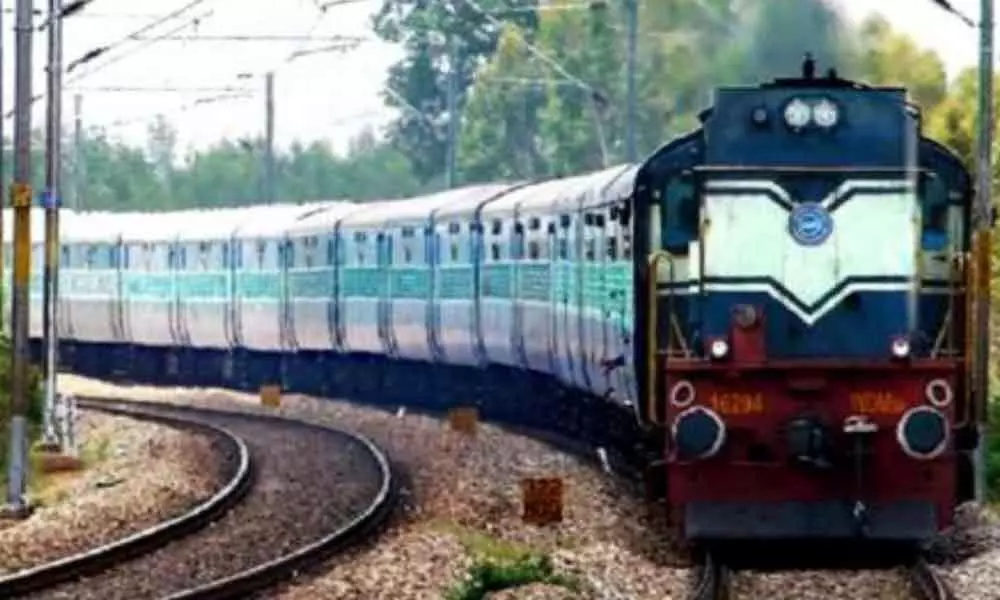Live
- They always want me to win, and now I feel lucky to have been offered a story like ‘Zebra’: Satyadev Kancharana
- ‘Democracy first, humanity first’: PM Modi in Guyana's parliament on two countries' similarities
- PKL Season 11: Telugu Titans register third straight win to top standings
- Is Pollution Contributing to Your COPD?
- NASA Unveils Underwater Robots for Exploring Jupiter's Moons
- Additional Central forces arrive in violence-hit Manipur
- AR Rahman and Saira Banu’s Divorce: Legal Insights into Common Issues in Bollywood Marriages
- 82.7 pc work completed in HPCL Rajasthan Refinery area: official
- Curfew relaxation extended in 5 Manipur districts on Friday
- Tab scam prompts Bengal govt to adopt caution over fund disbursement
Just In
2019-20 Safest For Train Passengers, No Deaths In Accidents So Far


Union Minister Piyush Goyal on Friday credited the railways' fatality-free run between April 1 and December 27 this year to the hard work of its 13 lakh- odd personnel.
New Delhi: The Indian Railways has recorded zero passenger deaths in rail accidents in FY 2019-20 so far, making it the national transporter's safest year in history, according to official data.
The railways recorded 16 deaths in 2018-19, 28 the previous fiscal, and 195 in 2016-17.
While between 1990-1995, an average of over 500 accidents took place every year with around 2,400 deaths and 4,300 injured in those five years; between 2013-2018, an average of around 110 accidents took place every year which killed around 990 people and injured about 1,500 people, according to data available with PTI.
Union Minister Piyush Goyal on Friday credited the railways' fatality-free run between April 1 and December 27 this year to the hard work of its 13 lakh- odd personnel.
"From April 1 to December 27 this year, we did not have a single (mishap-related) death of any railway passenger.
It is a great achievement by 13 lakh railway employees who work day and night, through thick and thin, through rains, snow, heat or even violence to ensure that trains run smoothly," the Railway Minister said.
Railway train accidents (consequential) includes collision, derailment, fire, level crossing accidents and other miscellaneous accidents.
While calculating the casualty due to a train accident, the number of persons killed are taken into account. The casualty is further categorised into death of railway passenger, railway staff and others.
The railways does not count run-over casualties as deaths in railway accidents.
The Railways has steadily improved its accident figures. While in 2017-2018, till March, there were 73 accidents, the first time the railways achieved a two-digit accident figure, the figure between April and December 15 in 2018 was 45.
In 2014-15, there were 50 accidents at unmanned level crossings, in 2015-16, it was 20, in 2016-17, it was 10, in 2017-18, three, in 2018-19, 3 and zero in 2019-20.
The number of injured in these accidents have also come down over the years. In 2016-17, 365 people were injured in various train accidents including the derailment of 15 coaches of the Ajmer-Sealdah Express on December 28, 2016, in which 44 were injured.
This was also the year when the Hirakhand Express derailed injuring 68.
In 2017-18, 195 people were injured, with a major accident in Khatauli in Uttar Pradesh where 97 people were injured and 23 were killed when the Kalinga Utkal Express derailed. In 2018-2019, 106 were injured.
It was also during this period that 59 people were killed and about 100 were injured when a train ran into a crowd of spectators who were standing on the tracks watching the Dusshera festival in Amritsar.
The railways, however, maintained that this incident did not come under the umbrella of train accidents as the spectators were "encroaching" upon railway property. In 2019-20, there were no accidents involving passenger trains, but some derailments of goods trains have occurred so far. While 33 passengers were injured in during this period, except the deaths of a few employees, no passenger deaths were reported.
Some of the rail accidents that occurred this year included the derailment of 11 coaches of the Seemanchal Express, the derailment of the Chhapra-Surat Tapti Ganga Express, fire in the Hyderabad Deccan-New Delhi Telangana Express Pantry Car and an accident involving two trains which collided with each other in Telangana in which 16 passengers were injured and motorman was killed.
The railways said they had been able to achieve zero deaths on tracks in 2019 because of a slew of measures undertaken over the last year.
This included mega blocks for maintenance, use of modern machines in maintenance, removal of all unmanned level crossings, replacement of ICF coaches with LHB coaches, track renewal and signalling modernisation and more delegation of power to field level officers.
While 156 ICF coaches were replaced with LHB coaches from April to November 2019, 92 were replaced in FY 2018-2019.
The railways also took major six-hour blocks for maintenance during 2019-2020 -- from April to November 153 such blocks were completed while 45 are underway.
In 2018-2019, 183 blocks were taken for maintenance purposes.

© 2024 Hyderabad Media House Limited/The Hans India. All rights reserved. Powered by hocalwire.com






